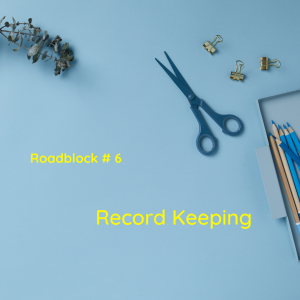Having your own business is exciting but comes with many challenges, especially in the first couple of years. However, there will always be roadblocks along the way which we must overcome.
In this blog, we discuss seven bookkeeping and accounts management roadblocks business owners regularly face.
Roadblock #1 – Opening a Business Bank Account
Many start-up sole traders make the mistake of not opening a bank account specifically for business. This can confuse all involved when trying to separate business and personal expenses.
A bank account specifically for the business would simplify your bookkeeping and your reconciliations more accurately.
Imagine how happy your bookkeeper and your accountant will be, not to mention how glad you’ll be with reduced bookkeeper and accountant’s costs!
Roadblock #2 – Recording The Ins and Outs of Your Business Finances
The “ins” are your income, and the “outs” are your expenses – these are called transactions.
You should be recording these transactions from the first time you pay an expense or receive income, such as loans related to the business.
3 Ways to Keep Track of Your Ins and Outs
- Using accounting software – you will need to carefully choose the accounting software that is best suited for your business. There are many on the market, so we suggest reaching out to your bookkeeper for guidance. THIS IS THE BEST WAY
- Record the transactions manually in a book or ledger
- Record the transactions in an Excel spreadsheet
Roadblock #3 – Using the Software

When you decide on which software to use, such as MYOB, Xero or QuickBooks Online (QBO), you should prioritise getting training to record transactions accurately.
Training by a certified and experienced bookkeeper or tax agent can help you and/or your employees to follow proper processes and ensure compliance.
In addition to compliance, the bookkeeper can explain financial reports, including the balance sheet, profit and loss, accounts receivables, accounts payables, liabilities, record keeping, budgeting, and cash flow monitoring.
Unfortunately, due to some misconceptions surrounding bookkeeping, many business owners are making unavoidable business mistakes. This article describes these misconceptions.
Roadblock #4 – Cash Flow

Cash flow is the financial measurement of the amount of cash generated by a business against the amount spent in the same period.
Cash generated includes sales or service revenues and interest earned, while expenses include loan payments, payroll, and other business costs.
Every business must keep an eye on its cash flow.
As per the 2019 Small Business Counts, a document produced by the Australian Small Business and Family Enterprise Ombudsman (ASBFEO):
“The challenge for small businesses to remain viable is exacerbated by the late payment of customer invoices. Just over half of small businesses receive invoice payments late, with late payments arriving an average of 23 days after they are due. Accessing external capital to support cash flow is also becoming more difficult. In February 2019, lending to businesses decreased by 2.4%, and since February 2018 it has decreased 3.3%.3″.
The following documents also provide some interesting ‘bedtime’ reading:
- Australian Small Business Key Statics and Analysis – produced by The Treasury3 Managerial Issues in this Reserve Bank document.
Roadblock #5 – Employees and Payroll
 Payroll is one of the most complex procedures in any business, thanks to the hundreds of awards applicable to the various aspects of payroll.
Payroll is one of the most complex procedures in any business, thanks to the hundreds of awards applicable to the various aspects of payroll.
This can include different industries, enterprise or bargaining agreements, piecework agreements, contractual agreements, different classifications within the awards and agreements.
In addition are various levels of pay, hourly rates, salary rates, piecework rates, casual rates, and many others listed in this blog about payroll compliance.
Roadblock #6 – Record-Keeping
 The Australian Taxation Office (ATO) and the Fair Work Ombudsman (FWO) have strict rules about keeping the business’ accounting, employees, and payroll records.
The Australian Taxation Office (ATO) and the Fair Work Ombudsman (FWO) have strict rules about keeping the business’ accounting, employees, and payroll records.
In general, you will need to keep receipts, bills, invoices, contracts, agreements, deposit slips, cheque butts, payroll records including timesheets, superannuation payments, and many more for a minimum of 5 years as per ATO and 7 years as per FWO.
Roadblock #7 – Staying Compliant
The ATO has set expectations expressly to ensure order and compliance.
Meeting these obligations through compliance will protect you from penalties and fees and, in some cases, prosecution.
In this article about ATO Compliance, you can find more information to ensure strict compliance with the ATO’s regulations.

At Sudoku Bookkeeping, we want to help you break through these roadblocks, so contact us here for a consultation.


